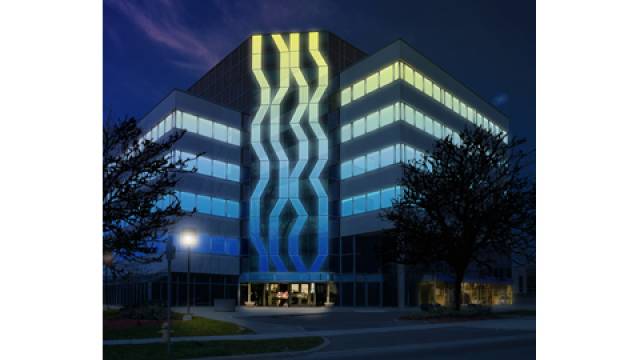Glassiled Uni – AGC’s new active, edge-lit glass product – features embedded LEDs that deliver uniform illumination across the pane
Glassiled Uni active glass features RGB LEDs embedded invisibly in the edge of the glass, making it possible to illuminate all or part of the facade. During the day, this product is indistinguishable from conventional glazing.
AGC Interpane will be leveraging its presence at glasstec 2018 in Düsseldorf (Hall 10, Stand G38) to present products designed to promote originality: solar control glass featuring enhanced technology and aesthetics, vacuum insulation glass, coloured laminated safety glass, active glass that can light up a façade in an explosion of colours, new decorative glass products and much, much more. However, the exhibit will mainly focus on the unique Coating on Demand service architects and designers can use to create custom coatings. The service will be presented in both a film projected on a large LED wall and in a 1:300 scale model skyscraper designed using this unique service and displayed in a glass case made of AGC’s nearly invisible Planibel Clearsight anti-reflective glass. During the special Glass Technology Live show, AGC will present a number of technological innovations, including a highly effective vacuum insulating glazing and a new thin anti-explosion technology.
Architects can deploy AGC Interpane’s new Coating on Demand (CoD) service to develop unique custom glazings tailored to their exact requirements and produced independently of the standard product range. Individual technical specifications and optical properties are custom-defined.
This innovative service is powered by AGC’s virtual prototyping software, which can deliver a true representation of coated glass in its environment under various climate conditions and based on the physical attributes of the glazing. The initial glass sample and mock-up are then manufactured – all on the same day. Every On-Demand Coating is unique and will not be used for any other building anywhere in the world. Visitors to this year’s glasstec can see an demonstration of this new service in a special video project on a large LED wall.
Glassiled Uni – AGC’s new active, edge-lit glass product – features embedded LEDs that deliver uniform illumination across the pane, enabling the entire façade or individual areas to be lit up in colours and even animated. During the day, Glassiled Uni can be turned off, rendering it completely transparent. For interiors, it is the perfect choice for creating unusual designs and privacy. Colour and privacy are also two key strengths of the new Stratobel Colour laminated safety glass. From transparent to translucent to opaque, this glass delivers the desired level of light transmission via multiple films. In architectural projects this makes it possible to create artistic designs using transparency both internally and externally, and to combine colour with aesthetics and security. The tones – Stone Grey, Mineral Grey and Terra Brown – combine seamlessly with AGC’s decorative glass range. The interplay between these colours will be effectively displayed at the booth in the form of rotating glass fins. Lacobel T and Matelac T decorative glass products will also be displayed in the same area, demonstrating just how many combinations are possible. These products also perfectly match – in terms of colour – the respective variants from the Stratobel Colour range that will be on display. Individual tones for decorative and laminated security glass can be created using the My Colour By service for orders of at least 200 m2.
AGC Interpane’s main focus is still on high-end solar control glass, as used in many globally famous architectural projects, and the company will be presenting a broad overview of some of the leading stars of international architecture. Products from the ipasol and Stopray ranges will be on display: high light transmission and a moderate solar factor, a very low solar factor, reflective and low-reflection glass, and new toughenable and bendable products. Information on solar control glass will be provided digitally via easy-to-use touchscreens.




